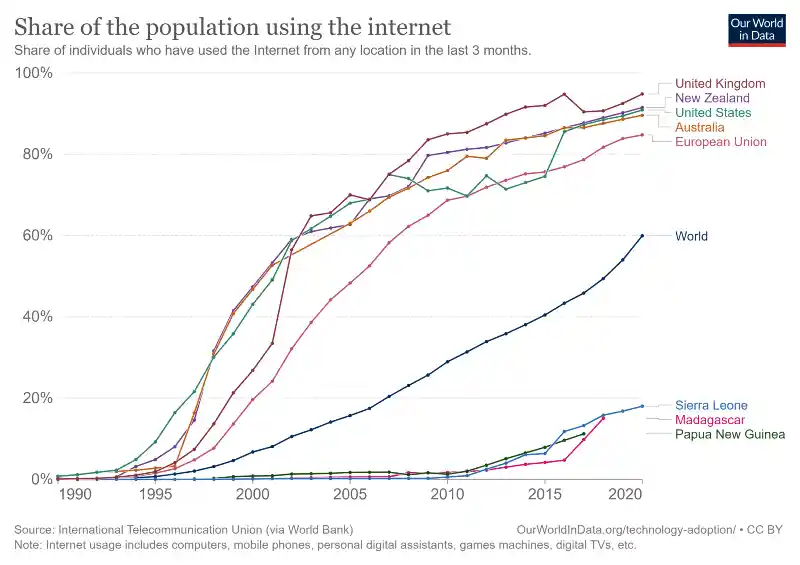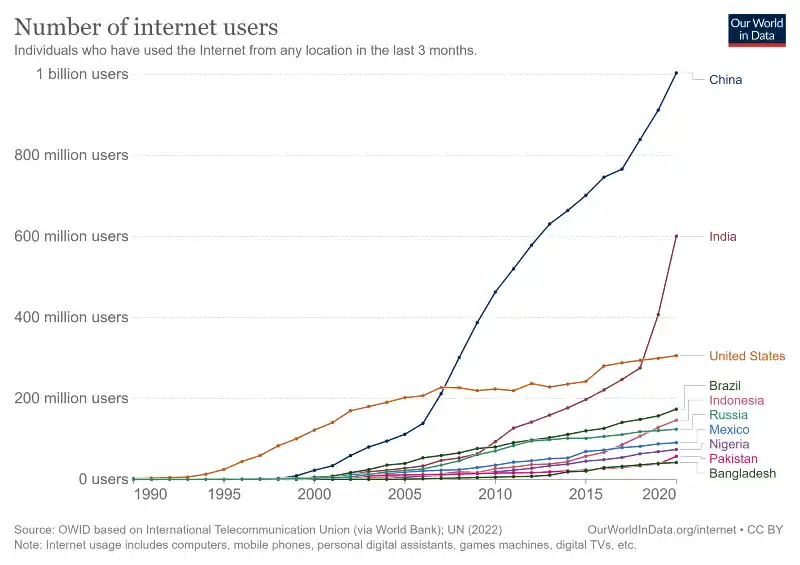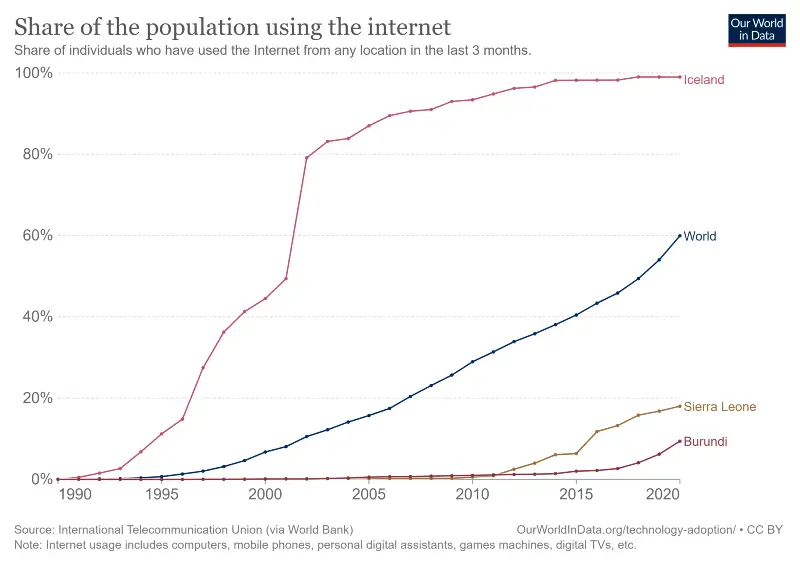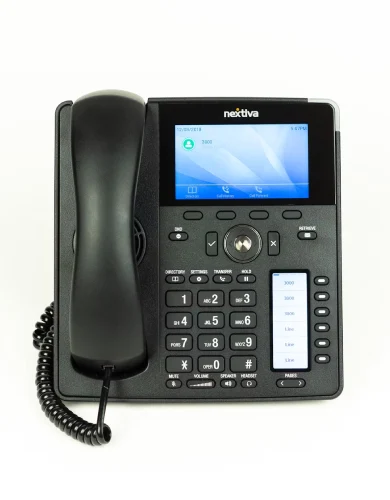Global internet penetration, what does it actually look like?
In developed countries like the UK, internet availability is taken for granted, and it is easy to believe this is the same everywhere.
We see so many social media posts in so many languages that it seems like everyone is already online.
But in reality, only 60% of the world actively uses the internet.
In this article, we use the amazing open-source data of ourworldindata.org to summarise the state of internet connectivity around the world and how a solution like Starlink could take us into unchartered connectivity territory.
Take 1: The gap is enormous
Whereas in much of the developed world, internet usage is ubiquitous, many of the poorest nations in South Asia and Africa are particularly disconnected, with less than 20% of the population regularly using the internet.
Most countries (which are within the ‘developing’ category) are actually somewhere in between these two extremes, with urban populations having access to a fast internet connection while rural areas remain disconnected (e.g. Latin America & Caribbean).
In any case, can you imagine life without a reliable internet connection? It would be virtually impossible to form part of the global economy, which is becoming more digital than ever. What would your job prospects look like? Or your understanding of a globalised society?

Take 2: Most of it is not in English
As permissionless as the internet is, it is clear that most of us remain on our language and cultural niches within the web. For us in the UK, it appears as if most of the internet is in English and is used by a western audience.
According to this database, this statement is only marginally true as 25% of users regularly access the English-speaking part of the internet.
This is certainly the largest proportion of any language but is not as dominating as some may have thought, with 19% of users interacting with the internet in Chinese, 8% in Spanish and the other nearly 50% in other languages.
And this should come as no surprise given that most internet users are NOT English-proficient. Out of the 4.7 billion global internet users in 2020, 1 billion were from China, 600 million were from India, and only 300 million were from the U.S.
Nb. Although India is considered English-speaking, only 10% of its population is proficient in English.

And this language distribution is also apparent on social media platforms like Youtube. This research found that only 33% of videos on YouTube in 2019 were fully or partially in English.
The same can be said about other social media and messaging services such as WhatsApp, which is available in over 100 countries and has over 2.2 billion global users messaging each other in what is probably 100s of different languages.
Take 3: Price correlation
Another intuitive belief is that when the internet is cheaper, there are more users, as even the poorest in the nation would be able to afford the internet.
This data analytics platform has put together global internet pricing statistics from where we can draw on some interesting conclusions.
When countries have high-quality infrastructure (i.e. fast and ubiquitous) and a lot of demand (i.e. technophile population with abundant devices), internet providers can offer lower prices as supply is more than ample.
For example, Italy’s mobile data infrastructure can provide 5G business broadband to 95% of its technophile population and, therefore offer some of the cheapest mobile internet in the world, averaging at $0.12 per GB of data.
On the opposite side, in countries with low-quality infrastructure (low-quality ADSL or satellite internet) and little demand (small, rural or very poor populations), internet prices tend to be extremely high.
For example, Burundi in central Africa is amongst the poorest nations in the world (in terms of GDP per capita) while simultaneously having the most expensive broadband due to its poor infrastructure and lack of device ownership. The result -in this case- is some of the lowest internet penetrations:

But this isn’t always true. Syrian internet is amongst the cheapest in the world despite its poor infrastructure, but this is because the Syrian Pound greatly depreciated against the U.S dollar.
Also, the U.S. and Canada have amongst the most expensive mobile internet in the world, but its technophile users are willing to pay the price for access.
For information on the state of internet prices in the UK visit our article on business broadband prices.
Take 4: The satellite internet revolution
Currently, the world’s internet provision is dominated by tethered broadband and LTE mobile data.
But what is going to happen when fast and reliable satellite internet like Starlink and its many future competitors (Amazon, OneWeb, etc.) become fully operational?
In fact, this is no longer in the far-flung future, as most of Europe and North America are already serviced by Starlink’s >3,000 satellites.
And most of the globe (excluding Africa, China, Russia and a couple of others) is about to gain regulatory approval for Starlink.
This means that many previously disserved or poorly covered regions will suddenly have fast internet availability.
Currently, this comes at a hefty price, but a rapid price drop is likely as mobile companies are gradually incorporating Starlink in addition to the use of LTE and 5G antennas, and governments will likely help subsidise these services for rural accessibility, as it is much cheaper than tethering remote locations or building antennas.
So what is going to happen when the world suddenly goes fully online? Are we going to spend our time forming global digital communities? How are we going to manage privacy with all of our information permanently stored online?
UK internet penetration
In the UK, business broadband coverage is almost universal supported by the following connection types:
- Tethered broadband connections – Full fibre and part-fibre networks provided by Openreach, KCOM, Virgin, Hyperoptic and a number of smaller internet service providers.
- Satellite business broadband – Provided by Starlink and a number of other competing providers.
- Mobile business broadband – 4G and 5G connections offered by four major carriers.
- ADSL – Almost universal coverage where fibre optic broadband is not available.
At Business Broadband Hub we offer one-stop platform to compare business broadband providers easily. Here’s a some links to our key pages:
Resources:
- Wikipedia – Countries by English-speaking population
- Wikipedia – Countries by GDP per capita
- ourworldindata.org – Internet section
- internetworldstats.com – Internet users by language
- pewresearch.org – Youtube research
- numbeo – Global internet pricing
- Business Broadband Hub blogs – Starlink

